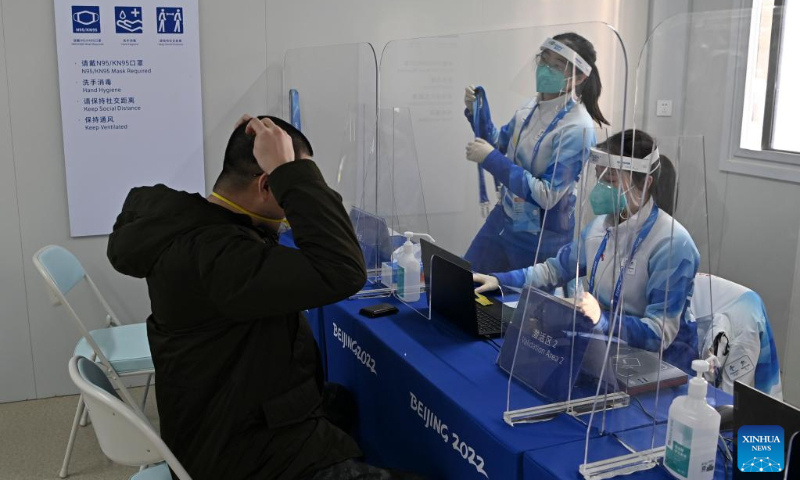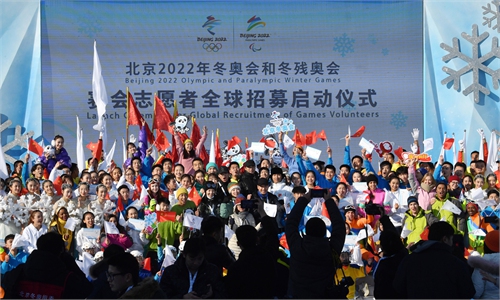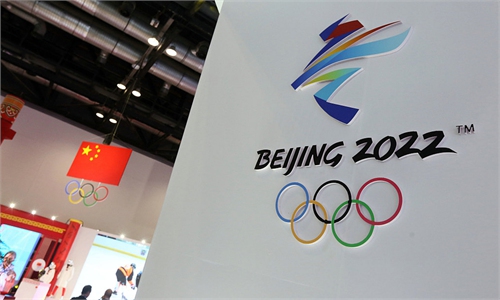
A journalist gets his certificate activated at the validation area of the Main Media Center for the 2022 Olympic and Paralympic Winter Games in Beijing, capital of China, Jan. 10, 2022. (Xinhua/He Changshan)
Beijing vowed to beef up measures to prevent a COVID-19 flare-up in China's capital and ensure people's safety as the Beijing 2022 Winter Olympic and Paralympic Winter Games approach. Besides the concerns raised by the latest domestic wave of COVID-19 in neighboring city Tianjin, the arrival of tens of thousands of overseas participants must alert the Chinese capital to the risk of imported infections.
Despite the hype by Western media saying that the Omicron variant and the Olympics could be "on a collision course with China's zero-COVID strategy," people from all walks of life reached by the Global Times said a rigorous and temporary approach to ensure the safety of people's lives is acceptable and laudable.
Beijing must leave no stone unturned in implementing epidemic prevention and control measures to ensure the capital, Olympics and residents are free from the threat of new flare-ups, Cai Qi, the Party chief of Beijing and head of the anti-epidemic command center, said on Wednesday at a special meeting.
Multiple regions including Central China's Henan, Northwest China's Shaanxi, South China's Guangdong Province, and especially Beijing's neighbor Tianjin, are battling epidemic resurgence. As of Thursday afternoon, Tianjin reported 126 confirmed COVID-19 cases and 22 asymptomatic carriers of the highly contagious Omicron variant, Tianjin health authorities said.
According to the latest regulation from Beijing municipal government, all people coming or returning to Beijing will be monitored and screened. Any person who is deemed a risk will be quarantined to keep out any potential cases. Those with travel history to medium-risk regions within 14 days should strictly follow epidemic rules and they will be required to quarantine at home and take a nucleic acid test.
Those who usually commute to Beijing from neighboring cities are encouraged to work from home to lower the flow of personnel. To prevent silent transmission within the city, Beijing will also escalate screenings, including testing those working in key industries.
The anti-epidemic command center suggested residents stay put during the upcoming Spring Festival holidays to reduce travel flows.
Experts said that as the efficacy of vaccines against Omicron variant is not ideal, grassroots prevention and management for arrivals to Beijing are the two most important ways to avoid community transmission.
The number and training of health and epidemic prevention staff should be increased, the capacity of community service volunteers should be improved, and people's daily necessities should be prepared, authorities stressed.
Beijing municipal government said on Thursday that they will strengthen the system maintenance of Jiankangbao, the widely used digital health monitoring and QR code system.
In action
Peking University Third Hospital, the only designated medical institution for Beijing Winter Olympics that covers all three competition zones in Beijing, Yanqing County and Zhangjiakou in Hebei Province, is ready for the event after undergoing training, and several drills and tests, the Global Times learned from the hospital on Thursday.
Epidemic prevention and control is the priority for the hospital's medical service, and the hospital selected some medical staff and experts with rich experience absorbed from their participation in the COVID-19 battle in the initial Wuhan outbreak to offer help on hospital infection management, the hospital said. It has also compiled a pocket guide on infection management for the Winter Olympics.
In order to block the potential risk of community transmission in time, the community and grassroots workers in Beijing are working harder.
Screenings for potential infection are being conducted much more often, a community employee from Beijing's Chaoyang district told the Global Times on Thursday.
The staffer said with the assistance of big data, she and her colleagues checked the recent travel history of every person in the community who may have come to Beijing from at-risk areas, and visited them door to door to make sure their home quarantine meets epidemic control standards.
The Global Times learned that many communities have strengthened training for grassroots workers and organized video conferences to help them keep abreast of the latest epidemic policies and requirements.
As the Omicron flare-up may have started on December 29, 2021, some experts said that while Beijing has yet to find any community transmissions of the new variant, it needs to be alert to potential risks given the frequent exchanges between the two cities, especially when many journalists covering Olympic and volunteers have yet to enter the closed loop.
Daily nucleic acid testing, two doses and one booster shot are required before entering the Olympic bubble, a college volunteer said.
There will be a volunteer training session at their future work venue, said the volunteer, who will be dispatched to the National Stadium, or Bird's Nest, for training that will include a course on epidemic prevention.
The Institute of Geographic Sciences and Nature Resources Research of Chinese Academy of Sciences (CAS) is just two kilometers from the Bird's Nest. A doctoral candidate from the institute surnamed Zhang said that the road linking the stadium and his office is blocked.
During the winter vacation, all personnel within the CAS campus are required to report their health condition daily, said Zhang, noting that he was told on Tuesday that the campus close to the Bird's Nest will undergo closed-off management during the Games.
'No' to Omicron but 'Yes' to Olympics
In contrast to the efforts and cooperation of the Chinese government and people, some foreign media have talked down China's epidemic prevention work, saying that even the "rigid" measures cannot guarantee that the Winter Olympics will be problem-free. But for China, this is not an excuse to be passive and to neglect people's safety.
The incidence of infection among Olympic participants in the biosecurity bubble of the Winter Olympics could be relatively high, Peking University respiratory specialist Wang Guangfa told the Global Times on Thursday.
A large number of foreign Olympic delegations will enter China in the near future. Wang said that although most Olympic participants are required to be fully vaccinated, because Omicron is highly contagious although with relatively mild symptoms, it could be difficult to detect infections. Therefore, the risk of infection brought by people coming in cannot be underestimated, and Beijing definitely needs a more prudent response.
Pierre Ducrey, the International Olympic Committee (IOC) Olympic Games Operations Director, on Wednesday told a remote technical briefing on Beijing 2022 that his impression is "extremely positive" after arriving in the Chinese capital a week ago. He gave a thumbs-up to the pre-Games closed-loop, which he labeled "very safe" with "a good number of" COVID-19 countermeasures in the Playbook already in place, the Xinhua News Agency reported.
China's dynamic zero-case approach is a huge contribution to the world, said an epidemic prevention expert from Peking University on Thursday.
Besides illustrating respect for people's lives and safety, the expert who requested anonymity told the Global Times that China's counter-virus approach ensures the steady development of China's economy, especially manufacturing which supplies the world.
He said that from the all-round zero-COVID policy to a dynamic zero-case approach to zero cases in community, China's zero-COVID policy shows a flexibility that can change according to the current situation.
"China is finding a balance gradually to adjust its policies, rather than the chaotic one-size-fits-all approach seen in the US and Europe," the expert said, "China is trying to protect social freedom as much as possible during the epidemic control."


